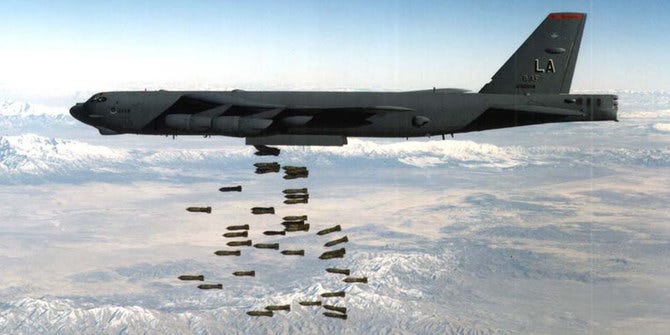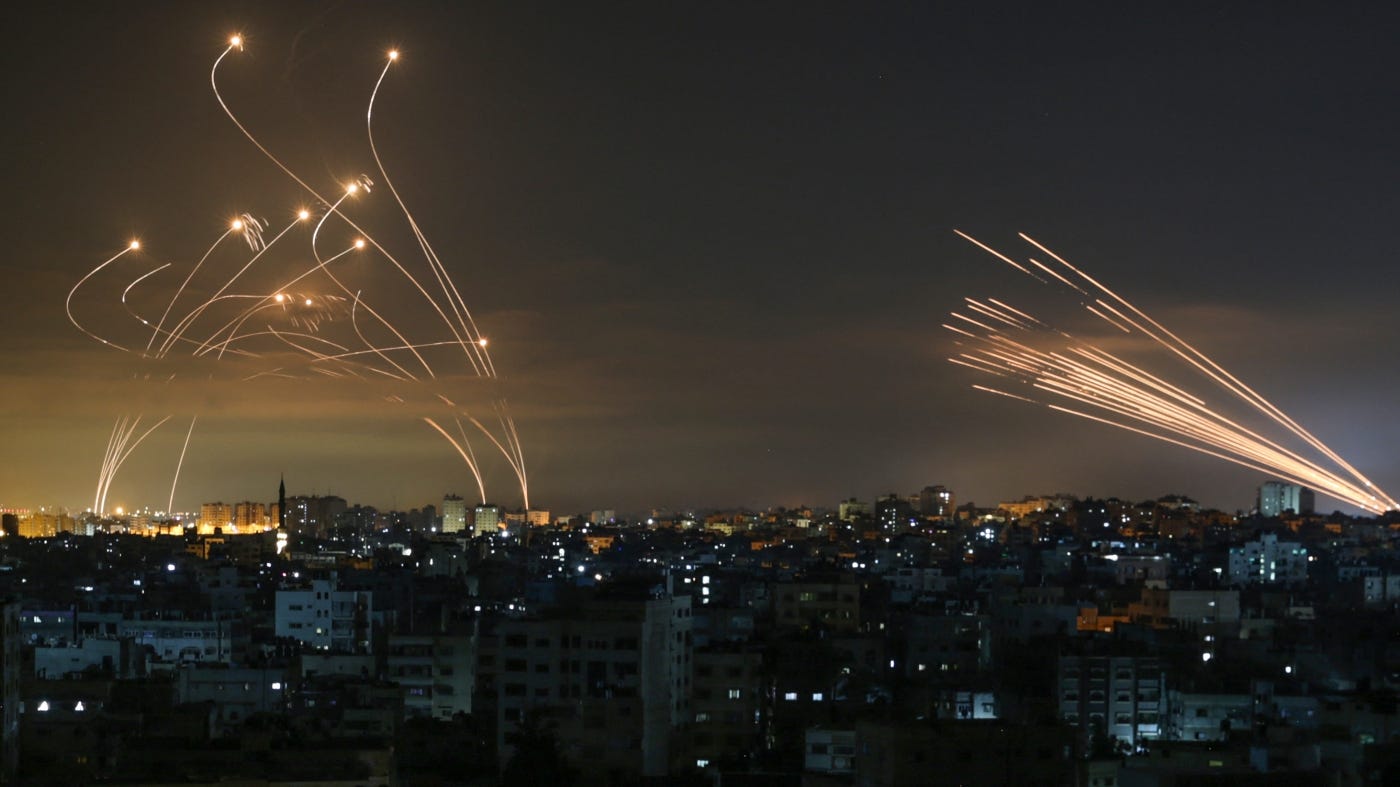United States/Israel vs. Iran: Global Stability, American Credibility, & Safety at Risk
Image Credit: LordOfMemes X Account
The recent US military action against Iran has ignited a fiery debate, with serious accusations flying about its legality, morality, and effectiveness. A recent discussion with legal and military experts sheds light on a truly unsettling perspective: that the actions taken by the President of the United States were not just unconstitutional, but potentially a war crime. This isn't just about politics; it has profound implications for global stability, American credibility, and even the safety of US personnel abroad.
The Unconstitutional Act: A President's Solo War?
The core of the argument against the strike rests on the US Constitution. Only Congress, not the President, has the power to declare war. Furthermore, this power is reserved for situations where a country poses an "immediate and grave military threat" to the United States. According to the analysis, Iran presented no such threat, especially given ongoing negotiations aimed at resolving perceived issues. Tulsi Gabbard, in her capacity as Director of National Intelligence, testified before Congress in March 2025 and stated that the intelligence community continued to assess that Iran was not building a nuclear weapon and that Supreme Leader Ali Khamenei had not authorized a nuclear weapons program since it was suspended in 2003. Yet when confronted with this fact by reporters on June 17th, President Trump bluntly stated “I don’t care what she says”.
Even if one were to consider the War Powers Resolution, a statute that requires the President to notify Congress and allow them an opportunity to respond before attacking a foreign country, it was allegedly ignored. This deliberate disregard for both constitutional and statutory law, resulting in the killing of people and destruction of property in another country without just cause, is unequivocally labeled a war crime and an impeachable offense.
The last formal declaration of war by the United States Congress was during World War II. Since then, numerous presidents have authorized military action AKA a ‘work around’ in foreign countries without a formal declaration of war. This is a complex area of constitutional law and international relations, often debated under the umbrella of the President's powers as Commander-in-Chief versus Congress's power to declare war.
Here's a list of presidents and some notable military actions since the end of WWII where a formal declaration of war was not issued:
Harry S. Truman (1945-1953):
Korean War (1950-1953): Often referred to as a "police action," the US intervened in Korea under a UN resolution, but without a specific Congressional declaration of war.
Dwight D. Eisenhower (1953-1961):
Lebanon Crisis (1958): Sent Marines to Lebanon to stabilize the political situation.
John F. Kennedy (1961-1963):
Bay of Pigs Invasion (1961 - Cuba): A covert operation to overthrow Fidel Castro, though it failed and was largely carried out by Cuban exiles with U.S. backing.
Vietnam (early involvement): Increased the number of military advisors and aid to South Vietnam.
Lyndon B. Johnson (1963-1969):
Vietnam War (escalation): While not a formal declaration of war, the Gulf of Tonkin Resolution (1964) provided broad congressional authorization for military action in Southeast Asia.
Dominican Republic (1965): Sent troops to intervene in a civil war.
Richard Nixon (1969-1974):
Cambodian Incursion (1970): Authorized bombing and ground operations in Cambodia during the Vietnam War.
Laos Incursion (1971): Supported a South Vietnamese invasion of Laos.
Gerald Ford (1974-1977):
Mayaguez Incident (1975 - Cambodia): Military operation to rescue the crew of a captured American merchant ship.
Jimmy Carter (1977-1981):
Operation Eagle Claw (1980 - Iran): An unsuccessful attempt to rescue American hostages in Iran.
Ronald Reagan (1981-1989):
Grenada Invasion (1983): US forces invaded to overthrow a Marxist government and protect American citizens.
Bombing of Libya (1986): Airstrikes in response to Libyan-sponsored terrorism.
Persian Gulf "Tanker War" (1987-1988): US Navy protected re-flagged Kuwaiti oil tankers from Iranian attacks.
George H.W. Bush (1989-1993):
Invasion of Panama (1989): Operation Just Cause to overthrow Manuel Noriega.
Gulf War (Operation Desert Storm, 1991 - Iraq/Kuwait): While not a formal declaration of war, Congress passed a resolution authorizing the use of military force.
Bill Clinton (1993-2001):
Somalia Intervention (1993): Involved in peacekeeping and humanitarian efforts, leading to the "Black Hawk Down" incident.
Haiti Intervention (1994): Sent troops to restore democratically elected President Jean-Bertrand Aristide.
Bosnian War (1995 - Bosnia and Herzegovina): NATO airstrikes and deployment of peacekeepers.
Kosovo War (1999): NATO air campaign against Serbia over its actions in Kosovo.
George W. Bush (2001-2009):
War in Afghanistan (2001-2021): Initiated after 9/11 with Congressional authorization for the use of military force (AUMF), but not a formal declaration of war.
Iraq War (2003-2011): Initiated with Congressional authorization for the use of military force, but not a formal declaration of war.
Other "War on Terror" operations: Airstrikes and special operations in various countries like Pakistan, Yemen, Somalia, etc.
Barack Obama (2009-2017):
Libya Intervention (2011): NATO-led military intervention to protect civilians, authorized by a UN Security Council resolution, but without specific Congressional authorization beyond notification.
Airstrikes in Syria and Iraq (against ISIS, 2014-2017): Conducted without a new AUMF specifically for ISIS, largely relying on the 2001 and 2002 AUMFs.
Drone strikes: Expanded the use of drone strikes in various countries, including Pakistan, Yemen, and Somalia.
Donald Trump (2017-2021):
Syria Airstrikes (2017, 2018): Strikes in response to alleged chemical weapons attacks by the Syrian government.
Yemen (support for Saudi-led coalition): Continued US support for the Saudi-led coalition in Yemen, which involved military aid and logistical support.
Somalia (airstrikes against al-Shabaab): Increased airstrikes against militant groups.
Iran (airstrikes/covert actions): Including the strike on Iran that was the subject of this discussion, and other actions.
There is a consistent trend in post-WWII US foreign policy where Presidents have exercised their Commander-in-Chief powers to deploy military force without a formal declaration of war, often citing bold-faced lies of national security interests (Weapons of Mass Destruction, nuclear enrichment), humanitarian concerns, or international obligations. This practice has led to ongoing debate about the balance of power between the executive and legislative branches in matters of war and peace. No matter who the people elect, the bankers, the military industrial complex, & the lobbyists will have their way. Formal declaration or not.
US Air Force photo via AP/file
A Pre-Planned Act of "Political Theater" with Zero Military Value
What did the United States military actually achieve with the deployment of 14 GBU-57 Massive Ordinance Penetrator (MOP) “bunker buster” bombs & over two dozen Tomahawk land attack cruise missiles? The grim assessment is that the strikes were an "illegal war of aggression" – the "ultimate war crime," as defined by Nuremberg prosecutor Judge Jackson. This was not a pre-emptive act of self-defense; there was no imminent threat. In fact, intelligence suggests the targeted nuclear sites (Isfahan, Natanz, and Fordow) were empty and had no military value.
Astonishingly, this strike plan, coordinated with Israel, was reportedly conceived and rehearsed over a year ago, extending back into the Biden administration. The deployment of B2 bombers, dropping massive 32,000-pound GBU57 bombs on sites that had long since been evacuated, or were too fortified to be significantly impacted, is described as pure "political theater." This begs the question: why put American lives at risk for an act with no tangible military objective?
The claims of "total obliteration" of facilities like Fordow have been vehemently challenged. Satellite imagery allegedly shows Iranians moving high-value centrifuges and enriched uranium before the strikes, meaning the attacks accomplished nothing in terms of retarding Iran's nuclear program. Instead, they revealed "American impotence" and a dangerous willingness to engage in actions that only serve to escalate tensions.
The International Fallout: A Rogue Nation?
The international reaction to these actions is critical. Russia and China, among other nations, are increasingly rejecting the "rules-based international order" championed by the US, instead advocating for a "law-based international order" premised on the United Nations Charter. This charter, ratified by the US Senate and thus part of American law, explicitly prohibits such unprovoked attacks against fellow signatories.
The international community, including Russia, China, India, and Pakistan, is expected to work towards isolating the United States and preventing further escalation. This includes potentially providing assistance to Iran, while simultaneously encouraging Iran to remain within the framework of international law in its retaliatory actions against Israel.
AFP via Getty Images
Israel's Vulnerability and the Illusion of "Iron Dome"
While the US actions have drawn international condemnation, the ongoing conflict between Iran and Israel also takes center stage. Despite Israeli efforts to control the narrative, reports suggest Iran's retaliatory strikes are causing "horrific damage" to Israel. Iranian missiles are described as highly accurate, targeting military and legitimate national security sites, a claim even echoed by a former head of an Israeli intelligence unit.
Furthermore, the effectiveness of Israel's much-touted Iron Dome defense system is being questioned. Despite having access to interceptor missiles and US backing, the Iron Dome is reportedly failing against modern missile threats. This raises concerns about the broader efficacy of American ballistic missile defense shields, which incorporate similar technologies. The strikes are seen as a daily demonstration that these defense systems are a "sham" and a "scam."
The Cost of Political Theater and a Dangerous Path Forward
The financial cost of this "political theater" is estimated to be over $100 million, a staggering sum for an operation that achieved nothing militarily. Even more concerning are the strategic risks. The President's unsupported claims of destroying Iran's nuclear program, coupled with the proven ineffectiveness of the strikes, paint a picture of a leadership detached from reality.
This situation puts tens of thousands of American service members deployed in the region (Saudi Arabia, UAE, Kuwait, Bahrain, Iraq, Syria, Turkey) at severe risk of retaliation. Iran has already demonstrated its capability to hit bases decisively, as seen with the attack on Al-Asad air base on January 8, 2020.
The path ahead is fraught with peril. With the Iranian nuclear program now dispersed and hidden, the question arises: what will the US do next? The possibility of a dangerous escalation, potentially involving nuclear weapons, looms if the current leadership continues its "insanity."
What's Next for Iran and the World?
Iran is expected to continue acting within the bounds of international law, focusing on isolating the United States and building an international coalition. Their long-term strategy, reportedly decades in the making, aims to "break the back of Israel." This involves sustained, lawful retaliation against Israel as long as Israel continues its strikes against Iran.
A crucial development is the public acknowledgment by former Russian President Dmitry Medvedev of Israel's nuclear program and its incompatibility with international norms. This US strike on Iran's nuclear sites could trigger a massive backlash against the nuclear non-proliferation regime, potentially compelling Israel to subject its program to international inspections once the dust settles. But no one ever talks about Israel’s possession of nuclear weapons. The Natural Resources Defense Council (NRDC) and the Federation of American Scientists (FAS) have estimated that Israel likely possesses between 80 and 400 nuclear weapons. Former U.S. President Jimmy Carter, who would have had access to intelligence on this matter, publicly stated in 2014 that he believed the number was closer to "300 or more." AIPAC makes sure it’s glazed over.
While some fear Iran might retaliate irresponsibly against US bases or other nations, the current assessment suggests they will prioritize a legally justifiable approach, seeking to contain the conflict and keep the focus on Israel's actions.
Closure of the Strait of Hormuz
As I mentioned as a possibility in my Substack article from last week, as of Sunday, June 22, 2025, Iran’s Parliament has officially approved a measure to close the Strait of Hormuz. Although the ultimate authority to close the strait rests with Iran’s Supreme National Security Council and Supreme Leader Ayatollah AL Khamenei, it’s definitely on the table.
A thread from an the X account The Kobeissi Letter, summarized the implications of the closure of the strait:
One fifth of global oil consumption flows through the strait daily. Although the stock markets have been closed, an immediate drop in oil supply is expected to send prices higher. JP Morgan estimates the closure of the strait could send oil prices to $120-$130 per barrel.
A sharp spike in energy prices could lead to a bump in Consumer Price Inflation (CPI) to around 5%. According to a Fed study, every $10 increase in oil prices has the abilty to increase inflation by 20 basis points. Oil prices are already up approximately $20 since April, potentially adding approximately 40 basis points to the CPI.
The below chart from the eia shows the origin & destination of the oil exports through the Strait of Hormuz:
Alternative sea routes are not available for oil-producing countries like Kuwait, Quatar, Bahrain, & much of Saudi Arabia’s production. This means these countries have no other direct path other than pipelines, which are limited.
Although estimates show approximately 6.5-7.5 million barrels of oil per day of production could be rerouted via pipelines, it would still be an approximate 65% drop in production, or 13% of global supply. If a prolonged closure occurs, some estimates price oil as high as $150-$200 per barrel.
Are Negotiations Dead?
Yesterday's "Operation Midnight Hammer" has undeniably exacerbated distrust in the United States, making any immediate return to good-faith negotiations exceptionally difficult from Tehran's perspective. Given the history of the United States with Iran:
JCPOA Withdrawal
“Maximum Pressure” sanctions
Constantly Moving Goalposts on nuclear deal, ballistic missile programs, etc.
Betrayal of Diplomacy
In essence, for Iran, yesterday's attacks are not an isolated incident but the latest manifestation of a long history of perceived hostility, broken promises, and attempts at coercion by the United States. From Tehran's vantage point, why would they trust a power that bombs their facilities one day and calls for negotiations the next, especially when the stated goal of those negotiations seems to be their further disarmament under duress? This creates an atmosphere where negotiations are likely seen as a trap or a demand for surrender, rather than a genuine path to a mutually beneficial agreement.
How can my Fellow Warriors Protect Themselves Financially?
A major conflict would likely cause extreme market volatility, disruptions to supply chains, and potential inflation.
Prioritize Emergency Savings:
Cash Reserves: Ensure you have a substantial emergency fund (at least 6-12 months of living expenses) in liquid, easily accessible accounts. I suggest having a variety of banks to include smaller credit unions in case the larger institutions get hacked. Keeping all of your eggs in one financial basket isn’t a good idea. In addition, keep a small amount of physical cash (small bills) at home in a secure, fireproof location, as electronic systems could be disrupted.
Diversify Currencies (if applicable): For those with higher net worth or international exposure, consider holding a portion of your wealth in stable foreign currencies, though this carries its own risks and complexities.
Based on factors like strong economic fundamentals, political stability, low inflation, and conservative monetary policies, the Swiss Franc (CHF) is widely regarded as one of the most stable currencies in the world, often considered a "safe haven" currency during times of global economic or political turmoil.
Review and Diversify Investments:
Safe Haven Assets: Historically, assets like gold and other precious metals tend to perform well during times of geopolitical instability and inflation. Consider a small allocation if you don't already have one.
Government Bonds: Low-risk government bonds (e.g., U.S. Treasury bonds) are often considered safe havens, as they are backed by the government.
Defensive Stocks: Consider increasing exposure to "defensive" sectors that tend to be more resilient during economic downturns, such as utilities, consumer staples, healthcare, and essential services (water, electricity). These companies provide goods and services people need regardless of the economic climate.
Real Assets: Investments in real estate (especially land with access to resources) or other tangible assets might offer some protection against inflation and currency devaluation.
Reduce Debt: Pay down high-interest debt, especially variable-rate debt, to reduce financial vulnerability during economic uncertainty. Balance transfers may also be a great option to take advantage of 0% APRs.
Secure Important Documents:
Gather all critical financial, legal, and personal documents (birth certificates, passports, social security cards, insurance policies, deeds, wills, investment statements) for all members of your family.
Store physical copies in a waterproof and fireproof safe at home, and keep digital copies on an encrypted external drive or secure cloud storage, accessible offline if necessary.
Insurance Review:
Understand your existing insurance policies (homeowners, renters, auto, health, life). Many standard policies have "war exclusions," meaning they may not cover losses directly resulting from acts of war.
"War risk insurance" exists, primarily for businesses operating in high-risk zones, but it's not commonly available or practical for individual homeowners in the U.S. unless direct conflict is imminent on U.S. soil. High target areas include major cities in New York & California.
Digital Security:
Strengthen cybersecurity for all financial accounts. Use strong, unique passwords, two-factor authentication, and be wary of phishing attempts, which often increase during crises.
Back up critical digital data to offline storage.
How can my Fellow Warriors Protect Themselves Physically?
Relocation - Still living in a major city? You may want to consider relocating, especially if you are in the following areas:
Images supposedly released from Iran’s recent batch of hacked Israeli intelligence files claim to expose Israel’s “Samson Option” nuclear target list. U.S. cities listed: NYC. D.C. L.A. Colorado. Also: Brussels, Paris, Berlin, Moscow, Beijing, Tehran.
Situational Awareness - Be more aware of your surroundings, especially in crowded public places such as malls, concert venues, amusement parks, & sporting arenas. Although one may be tempted to join in on various protests throughout the country, now is not the time to be a part of large crowds. I’m not saying don’t live your life, but be aware of the risks. We have no idea how many sleeper cells entered the United States over the past decade.
Improve Your Physical Fitness - as if you needed any more reasons to be fit, here are some benefits to being fit in a wartime scenario:
Increased Survival in Physical Threats:
Evacuation and Mobility: In a crisis, you may need to walk long distances, carry supplies, or move quickly to escape danger zones if traditional transportation methods are disrupted. Good cardiovascular fitness and strength are essential for this.
Self-Defense: While not everyone will be in direct combat, physical altercations can arise in chaotic situations. Being able to defend yourself or others can be vital.
Manual Labor/Resourcefulness: You might need to clear debris, build temporary shelters, or perform other physically demanding tasks to secure resources or ensure safety.
Endurance for Prolonged Stress: War scenarios often involve prolonged periods of high stress, disrupted sleep, and limited resources. A fit body is better equipped to withstand these physical and mental tolls.
Enhanced Mental and Emotional Resilience:
Stress Management: Regular exercise is a powerful stress reliever. In high-stress, uncertain environments, physical activity can help manage anxiety, reduce the impact of the "fight-or-flight" response, and prevent the cumulative effects of chronic stress from overwhelming you.
Improved Mood and Outlook: Physical activity releases endorphins and other brain chemicals that boost mood, reduce symptoms of depression and anxiety, and promote a more positive outlook, which is critical for maintaining morale and hope in dire circumstances.
Better Sleep Quality: Stress often disrupts sleep, but physical activity can improve sleep patterns, which in turn enhances cognitive function and emotional regulation.
Sharper Cognitive Function: Being physically fit can improve memory, concentration, and the ability to think clearly under pressure – all vital for making sound decisions in rapidly evolving crisis situations.
Increased Self-Confidence and Control: The act of taking care of your body and achieving fitness goals can boost self-esteem and provide a sense of control in a situation where much feels out of control.
Reduced Risk of Illness and Injury:
Stronger Immune System: A healthy body generally has a stronger immune system, making you less susceptible to illnesses. In a war-torn environment, access to medical care can be severely limited or non-existent, so preventing illness becomes paramount.
Faster Recovery from Injury: If you do sustain an injury, being in good physical condition can significantly improve your body's ability to heal and recover, reducing the risk of complications.
Injury Prevention: Strong muscles, good balance, and flexibility can help prevent common injuries (sprains, strains, falls) that might otherwise be debilitating in a situation with limited medical support.
Maintaining Functionality in Austere Conditions:
Thermoregulation: A fit body is often better at regulating temperature, whether in extreme heat or cold, which can be critical if shelter and climate control are compromised.
Resource Conservation: A physically efficient body might require slightly fewer calories for basic function compared to an out-of-shape individual, which could be a minor advantage if food resources become scarce.
Carrying Loads: You might need to carry heavy gear, supplies, or even injured individuals. Strength and stamina are directly applicable here.
Setting an Example and Supporting Others:
Your physical and mental resilience can be an inspiration to those around you, fostering a sense of collective strength and capability.
Being physically capable means you're more likely to be able to assist others who are less able, contributing to community resilience.
Until next time my fellow Warriors, Stay Vigilant, Stay Informed, Ever Forward!










